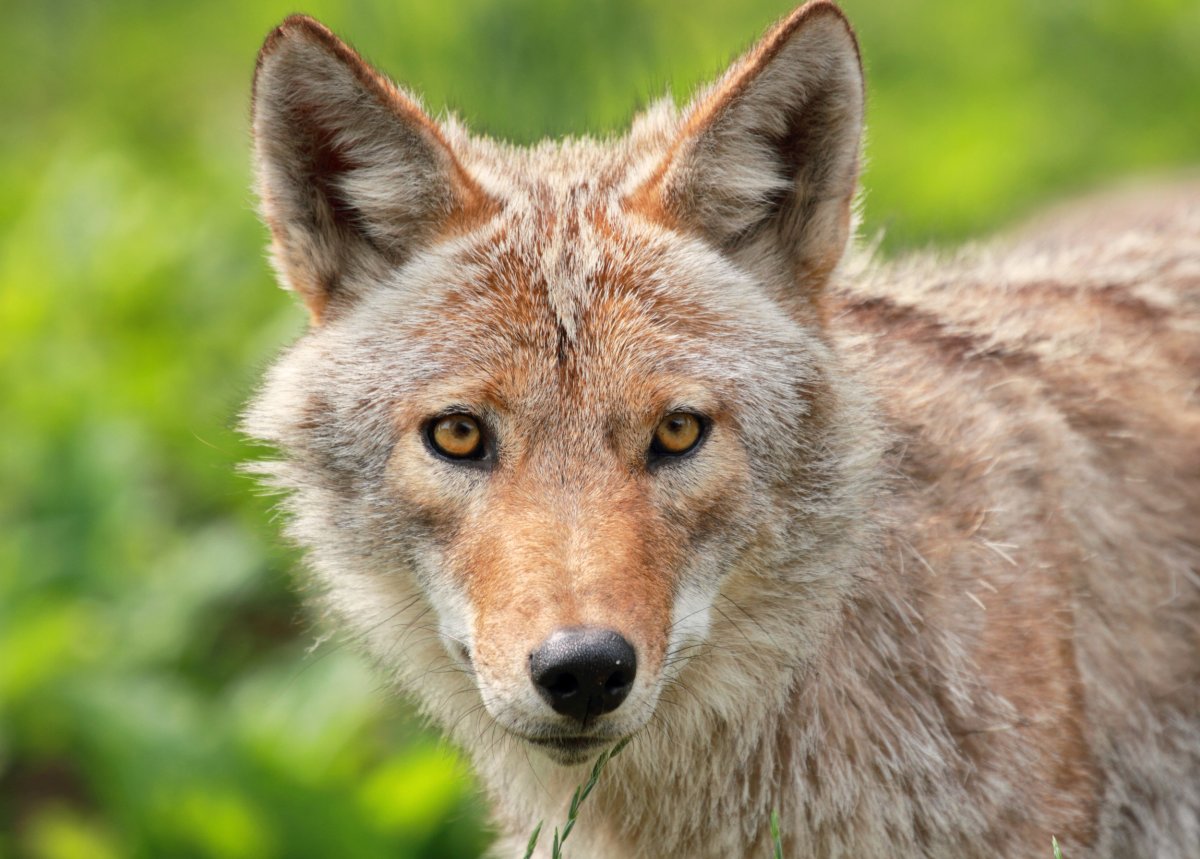Mysterious blue-eyed coyotes spotted living in California are still leaving experts puzzled.
Coyotes—which can be found all over the United States—usually have yellowish eyes and brown irises. They are born with blue eyes initially, but they gradually change color as they get older.
However, since 2018, adult coyotes with piercing blue eyes have been spotted wandering around areas of California, in particular the Point Reyes area to the north of the state.
Daniel Dietrich, the owner of wildlife and photography tour company Point Reyes Safaris, first snapped a picture of one of the animals in 2018, a 2019 report from SFGate said. Shortly afterwards, he spotted another. Since then, more photographs of the strange animals have been captured and it became clear that it was part of an emerging trend.

Experts believe the blue eyes are a result of a genetic mutation. But quite why it has developed remains a mystery five years later.
It's still an incredibly rare characteristic, and only a handful of these coyotes have been captured on camera. It's unclear how many blue-eyed coyotes there are.
James Brooks, a Ph.D. candidate at the Wildlife Research Center at Kyoto University, has looked into the potential causes of this phenomenon.
Brooks told Newsweek: "As of now, we really do not know why some coyotes have blue eyes. There haven't been any empirical studies yet about the frequency of blue eyes, the genetics, or the underlying causes. It's a really interesting and exciting question, but as of now we really don't know why we're seeing coyotes around Point Reyes with blue eyes."
The blue-eyed trait seems to be localized to specific areas of Northern California. It isn't clear whether any more blue-eyed coyotes have been spotted in other areas of the U.S.
In 2021, Heather Bené Dubin-Brians spotted one while driving to Pierce Point Ranch in Inverness, and posted a photo to Facebook.
Photographs have also been captured by photographer Jim Coda in 2019.
Brooks also co-authored the 2020 study: Coyotes living near cities are bolder: implications for dog evolution and human-wildlife conflict. This presented the hypothesis that the mutation could be linked to domestication.
In the study, Brooks and colleagues found that coyotes living in areas with high human populations and expanding housing developments, were behaving more boldly. Using camera traps, the scientists looked to discover whether coyotes in Northern California's counties were displaying signs of bold behavior, and potentially becoming more domesticated.
They found that coyotes living in more suburban environments were more likely to approach the camera. This is not surprising, as animals that live in close proximity with humans tend to become more curious, thus explaining why they were more likely to approach the camera.
But some of these "bolder" coyotes had unusual colorations known as "domestication traits."
"There are several species which have blue eyes, but interestingly variation in eye color within a given species is quite rare. In most species, either every adult has blue eyes or none do," Brooks said. "There are some bird species where eye color varies with age, but adult variation is rare. The only species reported to have variation in adult eye color are actually just humans and domesticated species."
One example this could be linked to is the domestication of dogs. Dogs evolved from gray wolves that become domesticated about 130,000 years ago. Dogs and coyotes are related, meaning that coyotes can display some of the domestication traits sometimes seen in dogs.
This also poses another theory—that these blue eyed coyotes are part dog. Hybrids between dogs and coyotes is a biologically possible. But again, more research into this is needed.
"[During the study] one of the traits that really caught our attention was the new eye coloration seen in Point Reyes, adding coyotes to the very small list of species with variation adult eye colors," Brooks said. "Our research was preliminary, and our aim with reporting these physical traits was simply to document that there seems to be something really interesting happening here. We will need focused research from a variety of angles to be able to understand why and how blue eyes came about in wild coyotes, but it certainly seems like an interesting and worthwhile field of study."
National Geographic, which published an article in 2019 analyzing the discovery, said that it is likely the mutation spans back multiple generations.
But this is also uncertain. Just because these blue-eyed coyotes were not seen before 2018, doesn't mean they did not exist beforehand. And quite when it emerged remains to be seen.
Another mystery is just how these blue eyes will effect the later evolution of coyotes and their adaptability to their environment.
Blue eyes for example, can potentially cause sensitivity to light, SFGate reported in 2019. The coyotes with blue eyes may end up changing their behavior due to this. The blue color could also potentially interfere with camouflage.
Do you have an animal or nature story to share with Newsweek? Do you have a question about coyotes? Let us know via nature@newsweek.com.
Uncommon Knowledge
Newsweek is committed to challenging conventional wisdom and finding connections in the search for common ground.
Newsweek is committed to challenging conventional wisdom and finding connections in the search for common ground.
About the writer
Robyn White is a Newsweek Nature Reporter based in London, UK. Her focus is reporting on wildlife, science and the ... Read more
To read how Newsweek uses AI as a newsroom tool, Click here.






